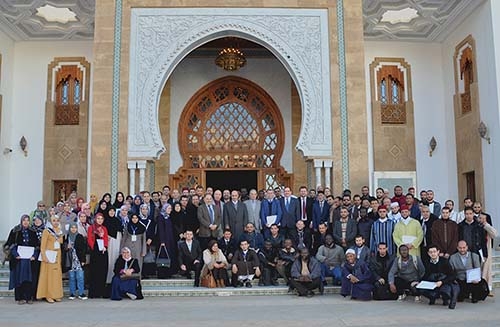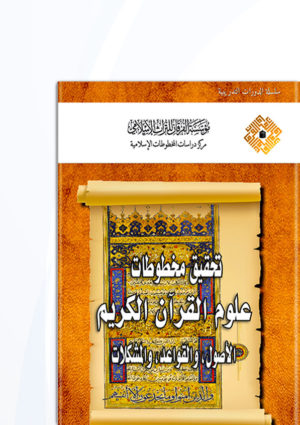An inaugural ceremony marked the first day of the 10th Training Course on Critical Edition, titled "Editing Manuscripts of Qurʾānic sciences: Fundamentals, Basics and Problems" organised by the Manuscript Centre at Al-Furqān Islamic Heritage Foundation in partnership with Dar al-Hadith al-Hassania Institute (Rabat, Morocco), where the course was held between the 29th of February and the 5th of March 2016. The ceremony began with a recitation from the Noble Qur’ān, followed by words of welcome from the organisers.
Day 1: Monday, 29 February 2016:
The course began with a lecture by Professor Bashar Awwad Ma’rouf, on “Investigating attribution: al-Ṭabarānī’s alleged exegesis text as an example”. The topic and lecturer were introduced by Professor Abdel Hamid Ashaq.
In his lecture, Professor Ma’rouf explained the importance of verifying the attribution of texts to authors as the very first stage in critical edition. He provided an example of such an error in the exegesis text attributed to the eminent scholar, al-Imām al-Ṭabarānī (died 360 A.H.).
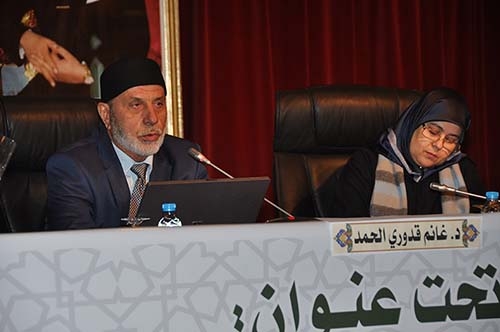
Afternoon Session: This comprised a lecture by the eminent scholar, Professor Ghanim Qaddouri Alhamad, addressing “Muṣḥaf manuscripts: Aspects of interest, and the position on their research”. Dr Farida Zumurrud introduced both lecturer and topic.
Professor Alhamad examined the importance of Qur’ān manuscripts or early Muṣḥaf copies, contrasting with the limited interest from manuscript practitioners, whether in cataloguing or research.
He addressed the topics of palaeography, orthography, and vocalisation marks in Qur’ān manuscripts, as well as the study of canonical readings (al-qirā’āt) in Qur’ān manuscripts and the study of initial verses (āyāt) in a chapter (sūrah), Qur’ān numbering system, and pausal signs (‘alāmāt al-waqf) in Qur’ān manuscripts.
Professor Alhamad then turned to the examination of decoration and illumination in Qur’ān manuscripts.
He also presented examples of the position of contemporary researchers on studying Qur’ān manuscripts.
Day 2: Tuesday, 1 March 2016
Morning Session: This session began with Dr Muhammad al-Tabarani’s lecture on “Proposals and views for a robust approach to editing manuscripts in the Qur’ānic and related sciences”, where Dr Muhammad Said Hinchi presented both lecturer and topic.
Dr al-Tabarani drew the course delegates’ attention to a set of guidelines, including:
● To properly verify the attribution of the manuscript to author.
● To distinguish between copy and narration.
● To verify the title and guarantee commitment to the author’s preferred title.
● To gather and collate all extant manuscript copies without fail.
● To add commentary only to resolve ambiguity and prevent misunderstanding, ensuring brevity and relevance.
● To divide the text appropriately and establish numbering.
Following Dr al-Tabarani’s lecture, Professor Ghanim Qaddouri Alhamad delivered another lecture titled “Manuscripts of the Mashriqī tradition in the discipline of Qur’ān orthography: introduction and importance”. This lecture was introduced by Dr Farida Zumurrud.
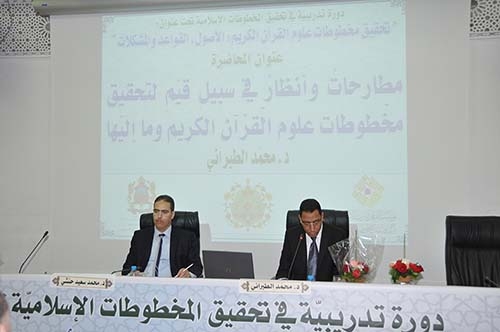
Professor Alhamad provided a historical presentation of the sources for the orthography of the very first Muṣḥaf, including an introduction and explanation of its importance.
He provided three examples of relevant textbooks, namely Khaṭṭ al-Maṣāḥif by al-Karmānī, al-Hijā’ fī rasm al-muṣḥaf by an unknown author, and Nathr al-marjān fī rasm naẓm al-Qur’ān by al-Ārkātī al-Hindī.
Afternoon Session: This comprised two practical workshops; the first led by Professor Bashar Awwad Ma’rouf, on “Editing manuscripts of Qurʾānic sciences: Fundamentals and basics”, with applied examples derived from his critical edition of the book, “al-Muḥallā” by Ibn Ḥazm al-Ẓāhirī.
The main points emphasised by Professor Ma’rouf in his lecture were:
● Gathering and examining all extant copies, and selecting the most reliable.
● Tracing the Prophetic traditions (Ḥadīth) cited back to original sources.
● Clarifying the ambiguities in chains of narration (al-asānīd) in the glosses.
● Indicating the author’s resources.
● Paying attention to margin content, and including this in the glosses of the edited text.
● Documenting the chain of narrators (al-takhrīj) and grade of the Prophetic traditions.
The second workshop was led by Dr Muhammad al-Tabarani, focusing on practical examples of problems faced in the critical edition of Qur’ānic science manuscripts. The most prominent problems highlighted within the workshop by Dr al-Tabarani were:
● Neglecting to divide the text appropriately.
● Inappropriate commentary on the text.
● Neglecting to explain archaic and challenging words.
He also pointed to the problems related to books on numbering, including:
● Neglecting vocalisation marks, especially at word endings.
● Neglecting to refer to books dedicated to the art.
Day 3: Wednesday, 2 March 2016
Morning Session: this began with the lecture by Dr Muhammad Jamil Mubarak on “Reading the manuscript given multiple possibilities, and the editor’s knowledge and culture”. This was introduced by Mr Sali Shahsivari.
Dr Mubarak highlighted the weakness in the actuality of critical edition. He pointed in his lecture to matters revolving around:
● The necessity of discerning the author’s methodology, and understanding his terminology.
● The influence of the editor’s knowledge and culture on the quality of the manuscript edition.
● Language as an essential mean for anyone wishing to enter the editing domain, especially in the Qur’ānic sciences
● The necessity of comprehending the possible variants encountered within the text.
The lecture of Dr Mubarak was followed by Dr Farida Zumurrud on “Subject bibliographies (Kashafāt)of exegesis textbooks: Concept, methodology, and purpose”. The lecturer was introduced by Dr Fatima Bousalama.
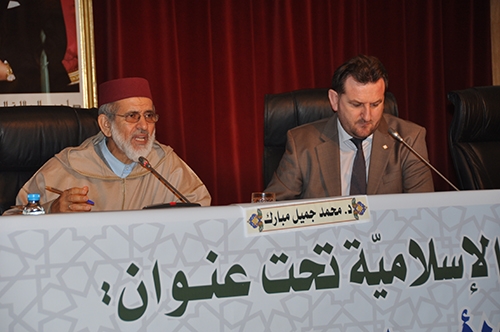
Dr Zumurrud began by clarifying the concept of bibliography (al-kashāf) in language, common terminology, and specialist terminology in library and documentation science, as well as the terminology of critical edition. She then covered some terms used in the bibliographic domain, namely edition, ordering, classifying, and cataloguing. She also spoke of the methodology of building bibliographies of exegesis textbooks and presented the types of scientific bibliographies for exegesis textbooks. Dr Zumurrud elaborated on the methodology of preparing a bibliography, defining its steps and enumerated the conditions and tools of bibliography creation by clarifying the most prominent obstacles to the practising bibliographers related to the extent of their ability to read, and comprehend the content of the exegesis text.
Dr Zumurrud concluded her lecture by providing examples of bibliographic good practice.
Afternoon Session: This comprised a practical workshop on “Gathering manuscript copies and methodology of examination”. This was designed by a number of specialised scholars, led by Dr Khalid Zahri. He used the manuscript “Tafsīr Sūrat al-Fātiḥah bi al-ishārah” by Shaykh ‘Abd al-Raḥmān b. Muḥammad al-Fāsī as an example for practical application.
The third day of the training course concluded with a public lecture by the eminent scholar, Professor Bashar Awwad Marouf, “Introduction to manuscript editing”, in which he presented the most important matters of concern to the editor.
Day 4: Thursday, 3 March 2016
Morning Session: the fourth day began with a lecture by Dr Tawfiq al-Abqari, titled “Editing the Qur’ān canonical readings text: Comprehension of authoritative link to origin and contexts of revelation”. The lecturer and topic were introduced by Dr Aziz al-Khatib.
The lecture addressed three principal dimensions, including: primary methodological foundations for the areas of editing canonical reading texts;
universal principles guiding to an ideal reading of the Qur’ān canonical reading text;
finally, common mistakes affecting some editors of the canonical reading text.
The lecture was followed by a practical workshop on reading the manuscript, and exploring script and symbols, led by a group of scholars and supervised by Dr Muhammad Said Hinchi.
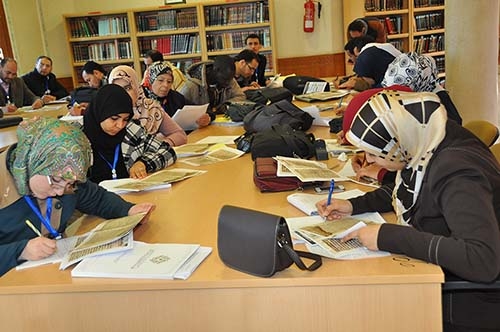
Afternoon Session: the course proceedings on the fourth day continued with two other workshops.
The first covered the topic of emendation (taḥrīr), introducing vocalisation marks (ḍabṭ), and collation (muqābalah), led by the instructors including Dr Abdel Aali al-Mudabbar.
The second workshop led by Dr Khalid Zahri, covered the topic of creating glosses and commentaries. The methods of developing glosses by orientalists (Germans, French) were presented by Dr Zahri.
Day 5: Friday, 4 March 2016
Morning Session: This comprised a lecture, titled “Treatment of Prophetic traditions (Ḥadīth) texts in editing manuscripts on exegesis and Qur’ānic sciences) delivered by Professor Bashar Awwad Ma’rouf, and introduced by Dr Muhammad Said Hinchi.
Professor Ma’rouf discussed different types of exegesis and highlighted the relevance of Prophetic tradition (Ḥadīth) and other traditions (āthār) on the study of these texts.
Professor Ma’rouf concluded that applying the methodology of Ḥadīth scholars in the grading of narrators of Prophetic and other traditions, is specific to the Ḥadīth domain. In contrast, this is not applicable to the domain of canonical variant readings.
The morning session continued with a lecture by Professor Ghanim Qaddouri Alhamad on “Manuscripts with unknown authors: Importance and treatment: Qur’ānic science texts as an example”. The lecturer and topic were introduced by Dr Ahmad al-Dubayyan.
Professor Alhamad began his lecture by clarifying the concept of the unknown, whether relating to author or title, and emphasised the importance of the topic. He proceeded to limit the scope of his lecture to manuscripts with unknown author, addressing the position of cataloguers regarding manuscripts whose authors were unknown, evidenced by the amount of unknown manuscripts, amounting to a third, in al-Fihris al-Shāmil; he also spoke of the requirements of cataloguers, editors and researchers regarding manuscripts; finally, he proposed a practical example of how to treat a manuscript of unknown authorship.
Afternoon Session: This comprised a practical workshop on the topic of authorship and title verification. It was supervised by several scholars including Dr Fatima Bousalama.
This was followed by another workshop dedicated to creating indices and bibliographies, again led by Dr Fatima Bousalama. Practical examples of creating indices and bibliographies were provided.
Day 6: Saturday, 5 March 2016
Morning Session: This began with a lecture by the eminent scholar, Professor Bashar Awwad Ma’rouf on “Methodologies for verification of Israelite narrations in books of exegesis”, introduced by Dr Abdel Aali al-Mudabbar.
The key points of the lecture were:
● A historical summary of the early beginnings of recording exegesis, the famous personas, and the early works to reach us.
● Detailed discussion on the Israelite narration: differences between narrations from Jews and Christians; the disagreement among exegesis scholars in citing narrations from Jews and Christians; the opinions of exegesis scholars on the limits of admissibility of narrations transmitted by Jews and Christians; and treatment of those companions and their successors, who transmitted such narrations.
● The duty of the editor in clarifying the level of the Israelite narrations, in terms of authenticity or otherwise.
Professor Ma’rouf concluded by noticing a lack of interest among editors to clarify the grade and distinguish Israelite narrations from fabricated narrations.
The morning session ended with a lecture by Dr Ahmad al-Dubayyan on “The Arabic and orientalist schools of edition”. This was introduced by Dr Abdel Majid Khayali.
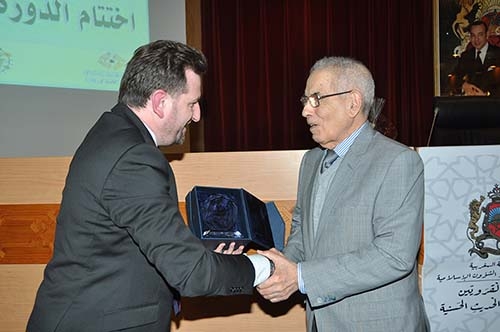
Dr al-Dubayyan explained the nature of edition by orientalists by drawing attention to key related matters, including:
● The diverse motives of orientalists in studying and editing Arabic heritage.
● The orientalists must be given due credit for the scientific research they undertook, especially that relating to critical edition.
● The Arabs had by far preceded the orientalists in critical edition.
● Contemporary Arabs had benefited from a number of books published on critical edition by the orientalists, well before eminent Arab editors had published their textbooks, such as Abdel Salam Harun, al-Munajjid, and others.
Dr al-Dubayyan also drew attention to the influence of the Arabic language on the Torah and Bible and discussed the evolution of orientalism, and the interest in the East and its heritage.
Afternoon Session: The training course ended with an open discussion led by a group of lecturers, including Professor Bashar Awwad Ma’rouf, Dr Ghanim Qaddouri Alhamad, and Dr Khalid Zahri, and was chaired by Dr Abdel Hamid Ashaq. The researchers participating in this session were able to seek academic advice on those problems and issues they face in their research and critical editions.
During the closing ceremony, words of appreciation and gratitude were exchanged by the two course organising bodies, Professor Bashar Awwad Ma’rouf, Fouad bin Houssaine Boulfaf and Dr Amal al-‘Ashmawi.
The course certificates, as well as a special qualification from Professor Bashar Awwad Ma’rouf, were given to the delegates.
